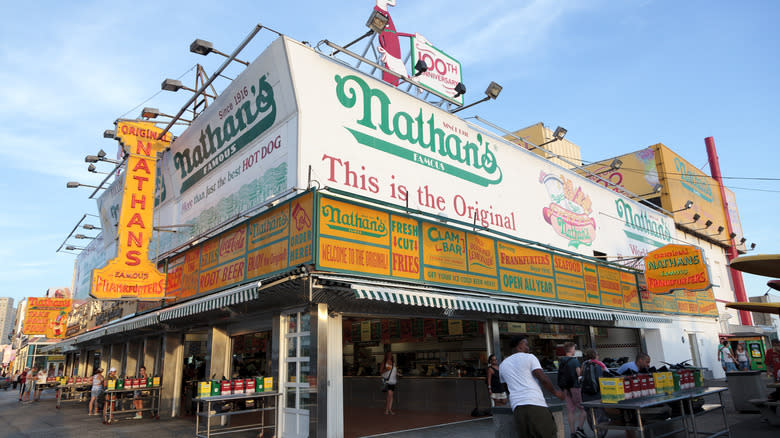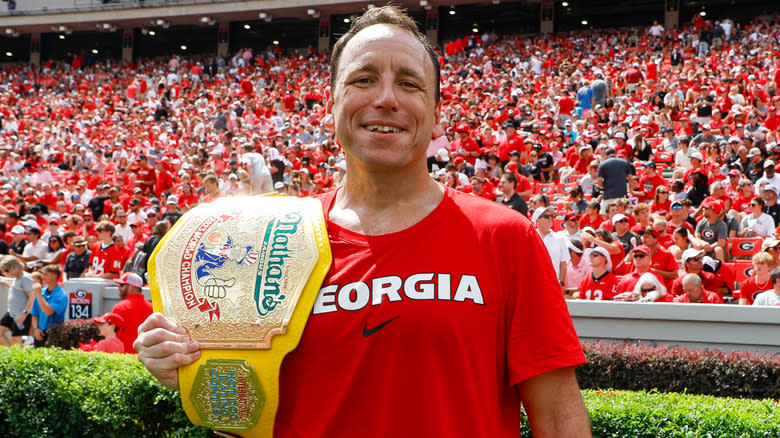The Contested Origin Of Nathan's Famous Hot Dog Eating Contest

- Oops!Something went wrong.Please try again later.
- Oops!Something went wrong.Please try again later.
Considered a 4th of July tradition by many, Nathan's Famous Hot Dog Eating Contest is a shining beacon of summertime overindulgence (which most attendees of backyard barbecues can relate to). This year's event will likely look much different now that Joey Chestnut is apparently banned from Nathan's Famous Hot Dog Eating Contest, so now is a good time to look back on the contest's origins to determine just how far it's come. The only problem is that the origin story described on Nathan's Famous website is likely a work of fiction.
The contest supposedly kicked off way back in 1916 at the site of the initial hot dog stand bearing the Nathan's Famous name. Four newly minted Americans wanted to determine who had the highest concentration of patriotism coursing through their blood, and they decided that the person who ate the greatest number of hot dogs would proudly bear the title. As compelling as that narrative may be to people who love America and hot dogs in equal measure, this story was concocted by two enterprising press agents who were also responsible for creating the contest. Along with partner Max Rosey, Mortimer Matz claimed that the 1916 origin of the contest, and the fact that it occurred on a yearly basis since that time, was fully fabricated.
Read more: The 15 Best Frozen Chicken Nuggets, Ranked
The Contest Actually Started Decades After It Was Originally Claimed

While the Nathan's Famous website features the story of the 1916 origin, it also states that the first officially recorded competition didn't take place until 1972. This is in line with Max Rosey and Mortimer Matz's association with the brand, which occurred in the '70s. Additionally, claims of hot dog eating contests taking place prior to that date also remain unfounded.
While Rosey and Matz deserve credit for creating the 1916 origin rumor, two other publicity agents are claimed to have given the tall tale a bit more detail. It's said that Richard and George Shea were responsible for the claim that the first hot dog eating contest involved immigrants to the U.S. arguing over their patriotism. This dogged argument apparently occurred within earshot of Nathan Handwerker, founder of Nathan's Famous, who thought that challenging the men to an impromptu hot dog eating contest was the perfect way to establish their loyalty to the country. The debated contest even had a supposed winner, Irish immigrant James Mullen.
The Man Behind Nathan's Famous Hot Dog Eating Contest

The creation of a hot dog eating contest seems somewhat needless when you consider that Nathan's Famous is pretty notable on its own. Just consider that the brand snagged the top spot in Daily Meal's ranking of fast food hot dogs. However, it can easily be claimed that the contest has only elevated the iconic brand, and that achievement is due in no small part to Mortimer Matz. Matz is considered an icon of the public relations industry, and his creation of the Nathan's contest is just one of numerous career highlights. For instance, Matz is credited as being the first person to have the idea to expand the New York City Marathon to all five boroughs.
While Nathan's Famous was quite well-known prior to the hot dog eating contest, the event has catapulted the brand into the upper stratosphere of celebrity. As reported by the BBC, the 2023 competition was expected to host 35,000 attendees. And if you're curious about just how much money Joey Chestnut's hot dog eating record would cost, the total is nearly $200 for a whopping 76 hot dogs. While there's no telling what the future may hold for the competition, here's hoping that it can live up to the fun but admittedly fanciful origin story.
Read the original article on The Daily Meal.

